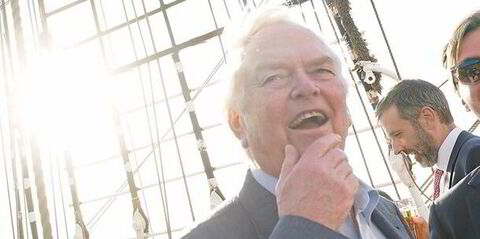“We are just waiting to see more blood run in the streets.”
Not Eric Bloodaxe but Norwegian shipowner, Tom Preststulen, who is looking forward to more carnage in the dry cargo market.
(Preststulen takes majority stake in Elkem Chartering)
“I expect a lot of companies will be in trouble very soon and will need to talk to their banks.”
Sounds as if Geir Sjurseth of DVB is making a bid to be a listening banker.
(Bankers fall out of love with offshore)
“Everyone says ‘dry bulk shipping is awful’ and yes freight markets have been very bad, but it has also been highly volatile, and we have a very good chance to make money when there is volatility in these markets.”
Philippe van den Abeele reveals he is a player with a taste for risk as Consortium Maritime turns a profit in an awful market.
(Volatility lifts Consortium Maritime profit)
“How can Cargill run 500 ships and Dreyfus 200 and you don’t hear of massive impairments and writedowns? People like to say cargo is king but risk management is king.”
Pointed advice from Peter Sandler of Edesia Asset Management who believes the boom years of 2006 to 2008 will never be seen again.
(‘Fatigue’ in private equity stalls further investments in dry bulk)
“The club ....recognises that its capital belongs to its members and that balance-sheet considerations should also take account of their concerns in what continue to be commercially challenging times.”
The West of England P&I club has more than $250m in its free reserve but chief executive Peter Spendlove is clear on whose money it is.
(West of England clocks up sweet underwriting result)
Hew Crooks of Ridgebury Tankers is up for a few tricks as he rides out on his unicycle.
(Ridgebury takes stance in favour of older tankers)
“We are concerned that the number of mariners is reaching the point where we have insufficient capacity.”
Sounds like MarAd chief Paul “Chip” Jaenichen is making a good case for further cuts in the reserve fleet.
(MarAd chief voices concern as US-flag ship tally threatens reserve fleet)
“There is a disconnect that exists between the cost of a newbuilding and the customer willingness to contract consistently long enough to make the economics work.”
Erik Johnsen of International Shipholding Corp gets close to identifying the problem that US newbuildings cost $80m to $125m, a multiple of the international market price.
(Charters key to unlocking renewal of boxship and bulk fleets)
“It provides owners with a good return on invested capital and, at the same time, it doesn’t give incentives to go and order four firm [ships] and four options and kind of destroy the market balance going forward.”
But there is an upside to the Jones Act according to American Shipping chief executive Pal Lothe Magnussen.
(Jones Act tanker market predicted to remain stable)
“In the opinion of ICS, this [flag of convenience] is actually a pejorative term that has its origins with a political industrial relations campaign waged by the International Transport Workers’ Federation.”
The International Chamber of Shipping makes a bid to get rid of an unhelpful label as Australia again focuses on the safety and crew welfare standards of open registry vessels.

“He is sad and I am sad.”
Nicolas Saverys and John Fredriksen are two sad shipowners as they call off an engagement that promised to be a gas.



